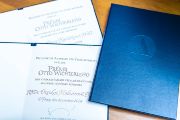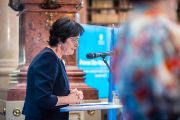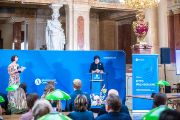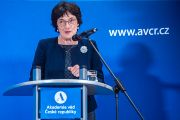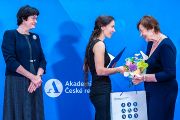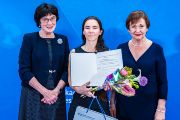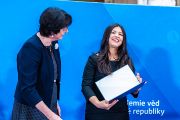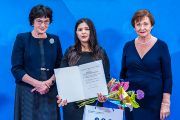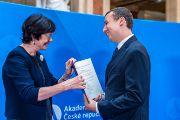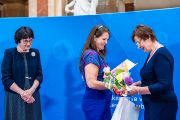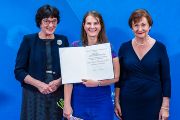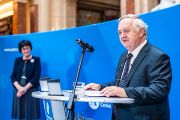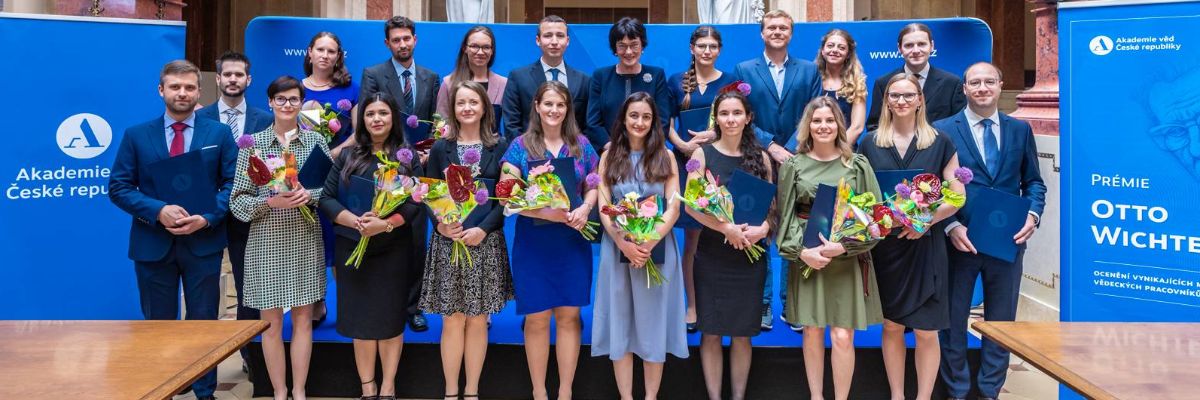
Two dozen young scientists received the Otto Wichterle Award
17. 06. 2024
Frustrated magnets, metallic materials suitable for treating fractures, corruption in public administration, the history of bark beetle infestations, and climate law. This is just a small sample of the fields that talented young researchers from the Czech Academy of Sciences are focusing on. On 13 June 2024, twenty researchers received the Otto Wichterle Award. Established in 2002, the award comes with a stipend of 330,000 CZK spread over three years. To date, there have been 520 laureates.
“Talented young scientists need more substantial support at the beginning of their research careers. Many of those who were awarded the Otto Wichterle Award by the Czech Academy of Sciences ten or twelve years ago are now at the forefront of their fields. Today’s laureates too represent the future of Czech science,” said Eva Zažímalová, who, in her role as President of the Czech Academy of Sciences, hosted the Otto Wichterle Award ceremony for the last time. Next year, the role will pass on to the institution’s new head, who will be chosen by the Academy Assembly of the CAS in December.
The awards were presented in three main scientific areas: 1, Mathematics, Physics, and Earth Sciences, 2, Life and Chemical Sciences, and 3, Humanities and Social Sciences. The diplomas were bestowed by the Vice-Presidents of these research areas – namely Ilona Müllerová, Zdeněk Havlas, and Ondřej Beránek.
This year’s laureates are:
Lenka Kubíčková, Institute of Physics of the CAS
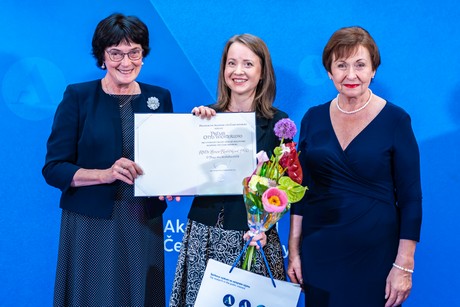
Kubíčková studies the fundamental properties of magnetic materials, such as so-called frustrated magnets or coordination compounds with transition metals. She also works in the field of nanoparticles, which have potential applications as contrast agents in medicine. The researcher partly specializes in experimental methods that use atomic nuclei as highly sensitive local probes. Kubíčková received a Marie Skłodowska-Curie Postdoctoral Fellowship, focused on her FRUMALIQ project (Frustrated systems with low-dimensional magnetism for magnetic refrigeration and hydrogen liquefaction), which she completed in Mainz, Germany. For her exceptional research, she was awarded the Becquerel Prize by the French Embassy in Prague during her PhD studies and later received the Czech Minister of Education, Youth and Sports Award as well.
*
Orsolya Molnárová, Institute of Physics of the CAS
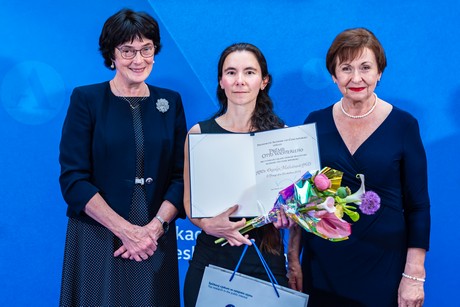
Molnárová focuses on the physics of modern metallic materials, physical metallurgy, the structure of solids, and electron microscopy. She studies the microstructures and mechanical properties of samples prepared by severe plastic deformation or powder metallurgy from selected alloys and has significantly contributed to the study of deformation processes in shape-memory materials. Through the reconstruction of martensitic microstructures in plastically deformed NiTi fibers, Molnárová and her colleagues discovered a new deformation mechanism. At the Institute of Physics of the CAS, the award-winning scientist is significantly contributing to the research of material groups with controlled microstructures and functional materials and composites.
*
Jan Pinc, Institute of Physics of the CAS
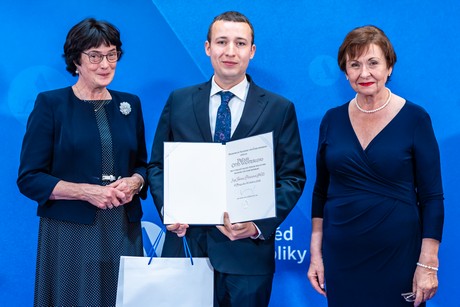
Pinc focuses on metallic materials that have the ability to gradually degrade in the human body, making them suitable for treating complex fractures in pediatric patients, where long-term fixation could lead to permanent bone deformities. In his research, Pinc utilizes modeling and 3D printing of special cells for in-vitro tests to minimize animal testing, as well as AI models for data evaluation. He is continuously developing collaborations with international partners and domestic manufacturers of metallic implants and striving to establish interdisciplinary connections in the field of implantology. Pinc’s study of the degradation behavior mechanism of Zn-Mg-based alloys was published in Bioactive Materials.
*
Shelja Sharma, Institute of Plasma Physics of the CAS
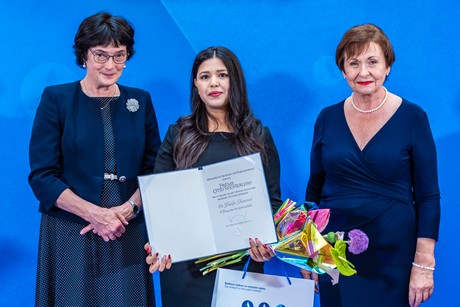
Sharma is developing new, efficient nanomaterials, which she has successfully tested for the detection of heavy metal ions and the removal of hazardous chemicals. She has expertise in catalyst synthesis and characterization, surface material properties, and advanced analytical techniques that utilize fluorescence sensing methods. At the Institute of Plasma Physics of the CAS, Sharma focuses on pushing the boundaries in chemical sciences with her innovative research. Her motivation stems from a passion for addressing environmental issues through the application of advanced materials and catalytic processes. The Indian scientist completed an internship at the University of Hull (UK) and has taught at Chandigarh University (India), where she won the Best Debutant Award. She has worked at the Institute of Plasma Physics since 2022.
*
Ľubica Vetráková, Institute of Scientific Instruments of the CAS
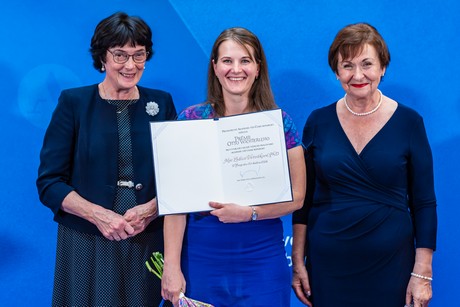
Vetráková specializes in environmental electron microscopy, which allows imaging of samples containing water in their natural state without drying or coating. Using this technique, she studies the structure of ice, its dynamic changes, and the properties of impurities frozen within it. For instance, recent research findings show that the main source of salty aerosols in polar regions is not frost flowers, as was long believed, but wind-blown saline snow particles. When this snow sublimates at very low temperatures, it produces small saline particles that can become airborne, forming aerosols, and impacting both regional and global climate.
*
Štěpán Timr, J. Heyrovský Institute of Physical Chemistry of the CAS
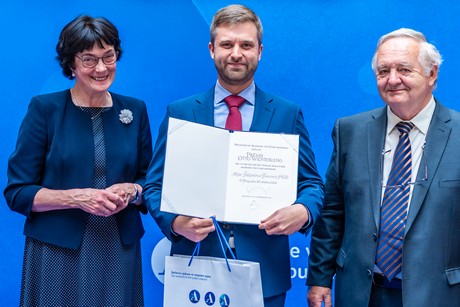
Timr focuses on computer simulations of proteins and other biomolecules, investigating how cellular metabolic processes work and how they are regulated. His research lies at the intersection of biology, chemistry, physics, and informatics. He is the leader of a research group focusing on glycolytic pathway enzymes, which play a crucial role in metabolic processes as they form the starting point for many other cellular pathways. He aims to connect a detailed description of individual molecules with an overall model of the given metabolic pathway. He has developed a set of tools for analyzing molecular simulations and described how molecular clustering affects protein stability. Additionally, he has contributed to the study of the relationship between protein movements and heat-induced cell death. Timr closely collaborates with three experimental groups in the USA and Germany and in 2022, he received the Lumina Quaeruntur Award from the Czech Academy of Sciences to develop his team.
*
Erik Andris, Institute of Organic Chemistry and Biochemistry of the CAS
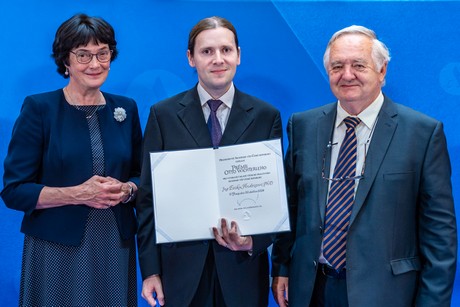
In his research, Andris combines a deep knowledge of organic chemistry with his passion for theoretical and computational chemistry. By means of computational screening, he managed to predict the existence of iron complexes in a singlet spin state, which he also subsequently confirmed experimentally. This work builds on his doctoral research, focused on iron complexes and their unique spectroscopy. His dissertation earned him the Zdeněk Herman Young Scientist Prize.
*
Daniel Bím, Institute of Organic Chemistry and Biochemistry of the CAS
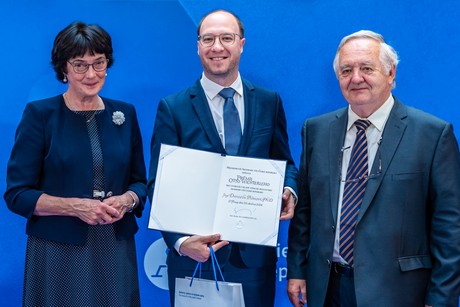
Bím combines experimental research with advanced theoretical chemistry methods. He focuses on sustainability in the chemical industry, working on capturing carbon dioxide from the air to reduce emissions and impact on the environment. He also studies photoredox catalysis using nickel complexes, which in the future could replace processes involving toxic heavy metals like palladium or platinum.
*
Jana Škerlová, Institute of Organic Chemistry and Biochemistry of the CAS
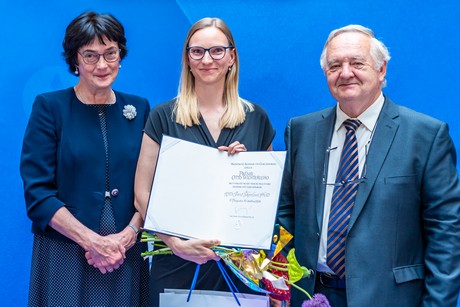
After completing her PhD in biochemistry, Škerlová spent two years as a postdoctoral researcher at Stockholm University in Pål Stenmark’s team, which focuses on botulinum toxin research. She contributed to elucidating the structure of new neurotoxins and gained experience in cryo-electron microscopy, a technique of immense importance in contemporary structural biology. She now works in Pavlína Maloy Řezáčová’s group and is part of a team dedicated to understanding the molecular mechanisms of various biological processes. Škerlová uses X-ray crystallography and cryo-electron microscopy to study protein interactions with DNA and RNA or small molecules in drug development.
*
Dmytro Didukh, Institute of Animal Physiology and Genetics of the CAS
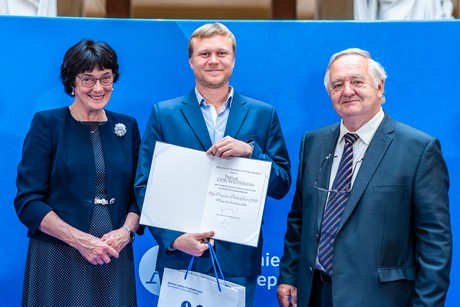
Not all animals, vertebrates being no exception, need males for reproduction. When the females can manage on their own, such animals are generally referred to as asexual. Dmytro Didukh is researching how asexual reproduction works in various groups of hybrid vertebrates, such as frogs, fish, and reptiles, where only females are present and they do not use male genetic material for reproduction. He has found, for instance, that these hybrid females can fine-tune the production of their sex cells to “create” eggs with the same genetic material as their mothers – essentially cloning themselves. He discovered that unrelated asexual groups of the spined loach (fish) and the gecko exhibit similar changes in the production of sex cells, which help them avoid infertility.
*
Maria-Cecilia Chiriac, Biology Centre of the CAS
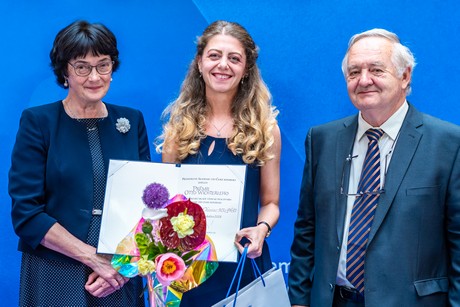
Currently, Chiriac is researching the little-explored group of bacteria known as Candidatus Patescibacteria and their unusual life manifestations. This group, with a reduced genome, accounts for approximately twenty percent of total bacterial diversity. These organisms are characterized by minimal metabolic capacity and mostly survive by parasitizing other prokaryotes. Chiriac is examining the diversity and biosynthetic pathways of these bacteria living in freshwater lakes using deep metagenomic sequencing methods. She was also the first to apply the CARD–FISH method on environmental samples to observe these microbes in their natural habitat.
*
Galina Prokopchuk, Biology Centre of the CAS
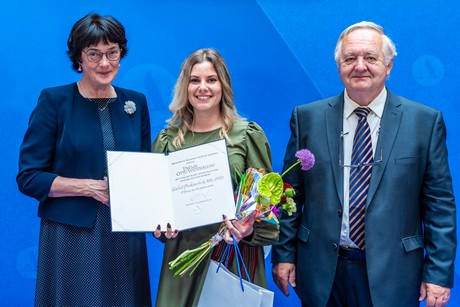
Originally trained in biophysics, Prokopchuk developed a passion for imaging methods during her Ph.D., ranging from light microscopy to electron microscopy, which allowed her to delve into the microcosm. She then began focusing on the biology of marine protists, particularly the little-studied diplonemids, which can be found abundantly in plankton. Her acquired technical and methodological skills have given Prokopchuk an exceptionally comprehensive and new insight into these protists. She joined Julius Lukeš’s research team in May 2016, just before completing her doctoral studies at the University of South Bohemia in České Budějovice. She has completed research internships at the University of California, Santa Barbara (USA), the University of Oxford (UK), and the University of Windsor (Canada).
*
Tomáš Štětina, Biology Centre of the CAS
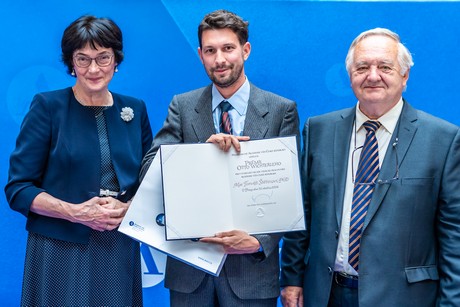
Štětina studies how insects cope with the cold. He began his scientific career during his bachelor’s and master’s studies, contributing to an article published in PNAS. He designed and implemented an observational method using a thermal camera to observe how frost penetrates cells and surrounding tissues in fruit fly larvae. During his Ph.D. studies, he applied advanced methods of molecular physiology—transcriptomics and metabolomics—to study insect resistance to low temperatures. Later, he successfully demonstrated that mitochondria play a key role in resistance to cold, frost, and frost damage.
*
Vojtěch Tláskal, Biology Centre of the CAS
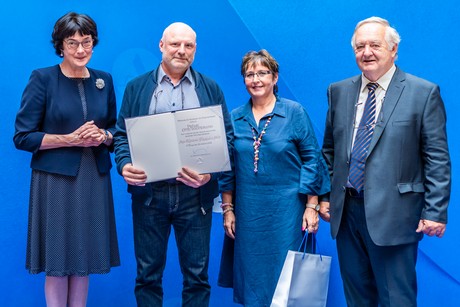
Tláskal examines bacteria that influence nutrient cycles in the environment. During his Ph.D. studies, he examined the microbiome of decaying tree wood in European forests. He described the microorganisms (bacteria and fungi) that break down organic compounds in wood into simpler substances, thereby elucidating important aspects of the carbon cycle in forests. Tláskal also demonstrated the activity of bacteria that retain nitrogen in wood, thereby enriching forest soil with this scarce element. His work is significant for modeling carbon and nitrogen flows in natural forests. He has discovered new soil bacteria species, identifying them as free-living ancestors of bacteria now known to live in insect hosts, such as tsetse flies or weevils.
*
Zuzana Štípková, Global Change Research Institute of the CAS
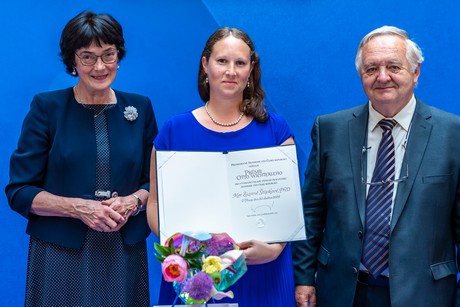
Štípková focuses on the causes of orchid species diversity and is the author of a detailed analysis of the biodiversity trends of terrestrial orchid species in the Czech Republic over the past 150 years. She has extensively studied the impact of agrarian policies during the Communist era on the decline of orchid diversity in Central and Eastern Europe, comparing it with developments in Western Europe. Her research also includes tropical orchid species found in South America, particularly in Colombia and Ecuador. Another area of her study is population growth dynamics in predator–prey relationships, especially concerning invasive ladybird species. Among her contributions is the debunking of a widely held belief about an invasive ladybird species allegedly suppressing local species, which was based on flawed statistical analyses.
*
Kristýna Bašná, Institute of Sociology of the CAS
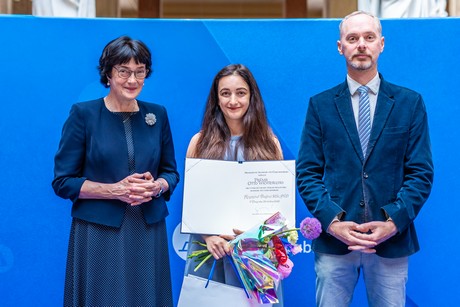
Bašná researches corruption (not only) in Czech public administration on an international scale. Her work has had significant societal impact, and the data obtained during her research has contributed to the development of legislative measures. For instance, she worked with the Czech Ministry of Justice on creating the Government Anti-Corruption Strategy for 2023 to 2026. She is also a member of several government advisory committees. Her research interests, which include social inequality, education, and social policy, align with her civic activities—she has advocated for government transparency and participated in a successful legal case regarding institutional transparency (lawsuit against the Office of the President of the Czech Republic, 2018–2020).
*
Eva Balounová, Institute of State and Law of the CAS
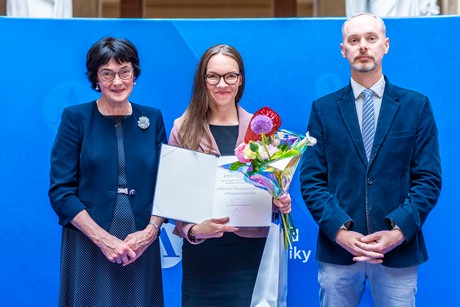
Since 2020, Balounová has been working at the Center for Climate Law and Sustainability Studies at the Institute of State and Law of the Czech Academy of Sciences and is one of the leading experts on climate law in the Czech Republic. She specializes in international and European climate law, climate litigation, climate legislation, and aviation. She studied at Charles University and the University of Iceland in Reykjavik. She is a co-author of the book Klimatické právo (Climate Law) and has published in prestigious scientific journals and participated in many international projects. In 2023, she received the Visegrad Group Academies Young Researcher Award.
*
Michaela Žáková, Institute of History of the CAS
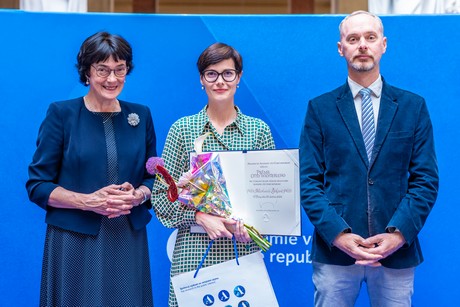
Žáková focuses on the history of noble elites, gender, and philanthropy. In her research, she highlights both the glamor and hardships of unmarried noblewomen and the women who took to the wheel during the pioneering era of automobilism. She is also interested in the history of everyday life in the 19th century. Žáková has explored these topics in numerous scholarly studies and several monographs. Her book Tereziánský ústav šlechtičen na Pražském hradě (The Theresian Institute of Noblewomen at Prague Castle) earned her the Josef Pekař Award in 2022 for best monograph in Czech history by an author under 35. She is actively participating in grant projects such as “Nobility without Monarchy: Old Elites in Post-Habsburg Central Europe (1918–38)” funded by the Czech Science Foundation and “The Czech Century of Motorism” (NAKI II) funded by the Ministry of Culture of the Czech Republic. Additionally, she is a dedicated science popularizer.
*
Kristýna Kaucká, Masaryk Institute and Archives of the CAS
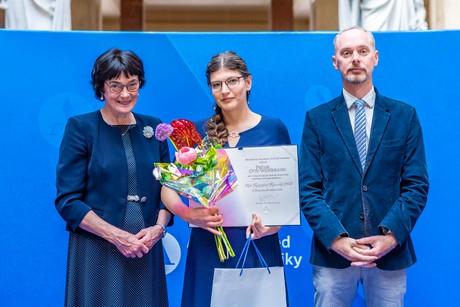
Although Kaucká primarily focuses on economic and environmental topics, the results of her work often extend into multiple disciplines. Her innovative approach to these topics makes them more accessible to a broader audience. She is currently leading the Czech Science Foundation project “Environmental Strategies of Noble Estate Owners during Landscape Transformation: Storms and Bark Beetles in the ‘Böhmerwald’ Area 1868–1929,” which has great potential to enrich the current discussion on forest protection in the Czech Republic.
*
Martin Zach, Institute of Philosophy of the CAS
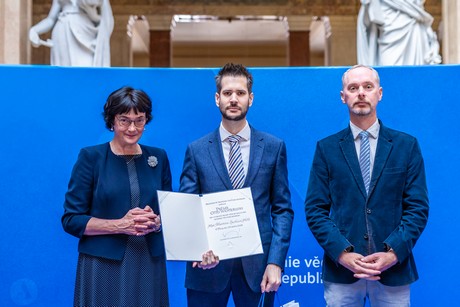
As a philosopher, Zach quite unconventionally focuses on medical topics, specifically immunology. In his research, he concentrates on the concept of disease tolerance and the interaction between the immune system and other physiological systems. Last year, he received the Award of the Czech Academy of Sciences for one of his publications, which offered a new perspective on scientific modeling through the study of mechanisms in cancer immunology. This work was published in the most prestigious journal in the field of the philosophy of science, The British Journal for the Philosophy of Science, marking the first time in the journal’s eighty-year history that someone with a Czech affiliation has published their research findings there. Zach has completed fellowships at the London School of Economics, University of Helsinki, and University of Bordeaux.
*
What is the Otto Wichterle Award?
The Otto Wichterle Award bestowed by the Czech Academy of Sciences, is intended to encourage exceptionally outstanding, promising young scientists at the CAS for their remarkable contributions to the advancement of scientific knowledge in a given area of science. Nominees with scientific degrees (CSc., Dr., Ph.D., DrSc.) are eligible, provided they are under 35 in the calendar year when the nominations are submitted (not counting parental leave). Nominations of candidates for the Award are submitted by directors of the CAS research institutes after consultation with the Institute Board. The Award bears the name of Professor Otto Wichterle, an outstanding world-renowned Czech chemist who became President of the Czechoslovak Academy of Sciences after the Velvet Revolution. More information about the Otto Wichterle Award can be found here.
Written and prepared by: Leona Matušková, External Relations Division, CAO of the CAS, drawing on the Czech press release of the CAS
Translated by: Tereza Novická, External Relations Division, CAO of the CAS
Photo: Jana Plavec, External Relations Division, CAO of the CAS The text and photos are released for use under the Creative Commons license.
The text and photos are released for use under the Creative Commons license.
Read also
- The Czech Academy of Sciences has appointed its new leadership for 2025–2029
- Literature is tied to its historical context. How can we read between the lines?
- Radomír Pánek: The Academy must be united, strong, and proactive
- A springtime booster: The healing potential of tree buds
- A novel compound that protects bone cells may benefit diabetic patients
- New interactive exhibition at the CAS showcases materials shaped by genius ideas
- Leaf growth, root formation, and reproduction – Look to hormones for the answer
- Without volcanoes, life on Earth wouldn’t exist, says Lukáš Krmíček
- What are the Open Science principles of the Czech Academy of Sciences?
- Meadow flowers unlocking evolution: Scientists decode Y chromosome DNA
The Czech Academy of Sciences (the CAS)
The mission of the CAS
The primary mission of the CAS is to conduct research in a broad spectrum of natural, technical and social sciences as well as humanities. This research aims to advance progress of scientific knowledge at the international level, considering, however, the specific needs of the Czech society and the national culture.
President of the CAS
Prof. Eva Zažímalová has started her second term of office in May 2021. She is a respected scientist, and a Professor of Plant Anatomy and Physiology.
She is also a part of GCSA of the EU.
